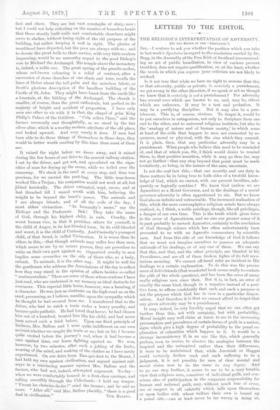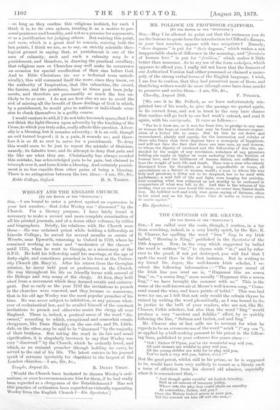LETTERS TO THE' EDITOR.
THE RELIGIOUS INTERPRETATION OF ADVERSITY. ere ms EIHTOR Or THZ " EPETATOR.") Sin,—I venture to ask you whether the position which you take in last week's Spectator in regard to the resolution carried by Dr. Begg, in the Assembly of the Free Kirk of Scotland (recommend- ing an act of public humiliation, in. view of various present troubles), does not require qualification, or, at the least, whether the words in which you express your criticism are not likely to mislead.
Is it not true that while we have no right to assume that this or that adversity, public or private, is certainly a punishment, we get wrong in the other direction, if we speak or act as though we knew that it certainly is not a punishment ? For adversity has several uses which are known to us, and, may be, others which are unknown. It may be a test and probation. It may be a purifying discipline. But it may also be a pun- ishment. This is, of course, obvious. To forget it, would be to put ourselves in antagonism, not only to Scripture from one end to the other, and to universal religious instincts, but also to the 'analogy of nature and of human society,' in which some at least of the evils that happen to men are connected by se- quences, moral or physical, with the sins which they commit. It is plain, then, that any particular adversity may be a punishment. What people who believe this need to be reminded of, and that of which you, Sir, I think would desire to remind them, is, that positive assertion, while it may go thus far, may not go farther—that any step beyond that point must be made tentatively, as being, in the nature of the ease, uncertain.
Is not the real fact this,.—that our security and our duty in these matters lie in being true to both sides of a twofold know- ledge of God, which we cannot, with our present faculties, ade- quately or logically combine ? We know God (unless we are Agnostics) as a Moral Governor, and in the dealings of a moral governor adversity is often apportioned to sin. But we know God also as infinite and. unknowable. The increased realisation of this, which the more contemplative religious minds have always realised, is, I think, a noble privilege, though, like all privileges, a danger of our own time. This is the truth which gives force to the error of Agnosticism, and we owe our greater sense of it in part probably to earnest Agnostics, certainly to the revelation of God through science which has often unfortunately been presented to 118 with an Agnostic commentary by scientific men. And from this side of our knowledge of God it follows that we must not imagine ourselves to possess an adequate rationale of his dealings, or of any one of them. We can say that this and that, and the other principle, are blended in his Providence, and are all of them broken lights of its full mys- terious meaning. We cannot off-hand refer an incident in His dealings to a certain explanation. To do this was the precise error of Job's friends (that wonderful book scorns really to contain the pith of the whole question), and has been the error of many really religious men since then. But it is, in fact, an error of exactly the same kind, though in a negative instead of a posi- tive form, to affirm confidently that such and such a purpose is not the purpose which God has in view in a particular dispen- sation. And therefore it is that we cannot afford to forget that any given adversity may be a punishment. It may, indeed, be very forcibly urged that we can often get further than this, not with certainty, but with probability. Moral insight may well claim at times to see in the increasing presumption and prevalence of certain forms of guilt in a nation, signs which give a high degree of probability to the penal ex- planation of calamities which happen to it. It would be a strange inconsistency if, in an age like this, which generally prefers, even to excess, to observe the analogies between the inspired and the uninspired rather than their 'differences, it wore to be maintained that, while Jeremiah or Haggai could certainly declare such and such suffering to be a judgment, it is not possible for men of clear mental and moral vision now to do the seine in. any degree. And to go one step further, it seems to me to be a very tenable view that religious men, conscious of individual guilt, and con- scious also of participation in the corporate responsibility for human and national guilt, may, without much fear of error, see or suspect in all calamity which falls upon themselves or upon bodies with whose welfare their own is bound up a penal side,—can at least never be far wrong in doing so, —HO long as they confine this religious instinct, for such I think it is, to its own sphere, treating it as a motive to per- sonal penitence and humility, and not as a premise for arguments, or as a, justification for judging others. But waiving this point, and even, which is a great deal to concede, waiving both the last points, I think we are, so to say, on strictly scientific theo- logical ground in saying that, as punishment is one of the uses of calamity, such and such a calamity may be a punishment, and therefore, in drawing the practical corollary, that religious men or Churches may well make its occurrence an occasion for special recollection of their sins before God. And to Bible Christians (to use a technical term untech- nically), this will commend itself the more, since they know, on the authority of Inspiration, that like calamities, the sword, the famine, and the pestilence, have in times past been judg- ments, and therefore are presumably so much the less un- likely to be so now. I do not see how else we are to avoid the risk of missing all the benefit of those dealings of God in which, by a punishment, he would give to nations or individuals occa- sion to cheek themselves in a guilty course.
I would, venture to add, if I do not take too much space, that I do not think the light thrown upon adversity by the teaching of the Cross, to which you truly refer, really affects this question. Adver- sity is a blessing, but it remains adversity ; it is an evil, though an evil turned to good ; it is a pain, it wounds ; and there- fore it is as fit as over to serve for a punishment. To deny this would seem to be just to repeat the mistake of Stoicism, namely, its falsetto tone, and its attempt to deny that pain and the like are what they are. Christianity has always avoided this mistake, has acknowledged pain to be pain, but claimed to triumph over it, and turn it into a blessing. And certainly punish- ment is no leas capable than other pains of being a blessing. There is no antagonism between the two ideas.—I am, Sir, &c.,































 Previous page
Previous page